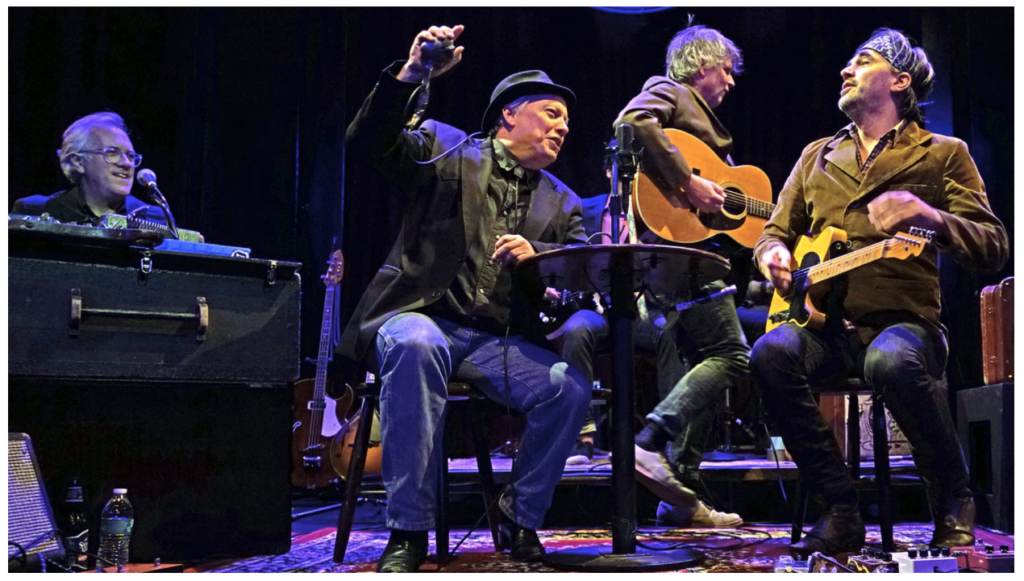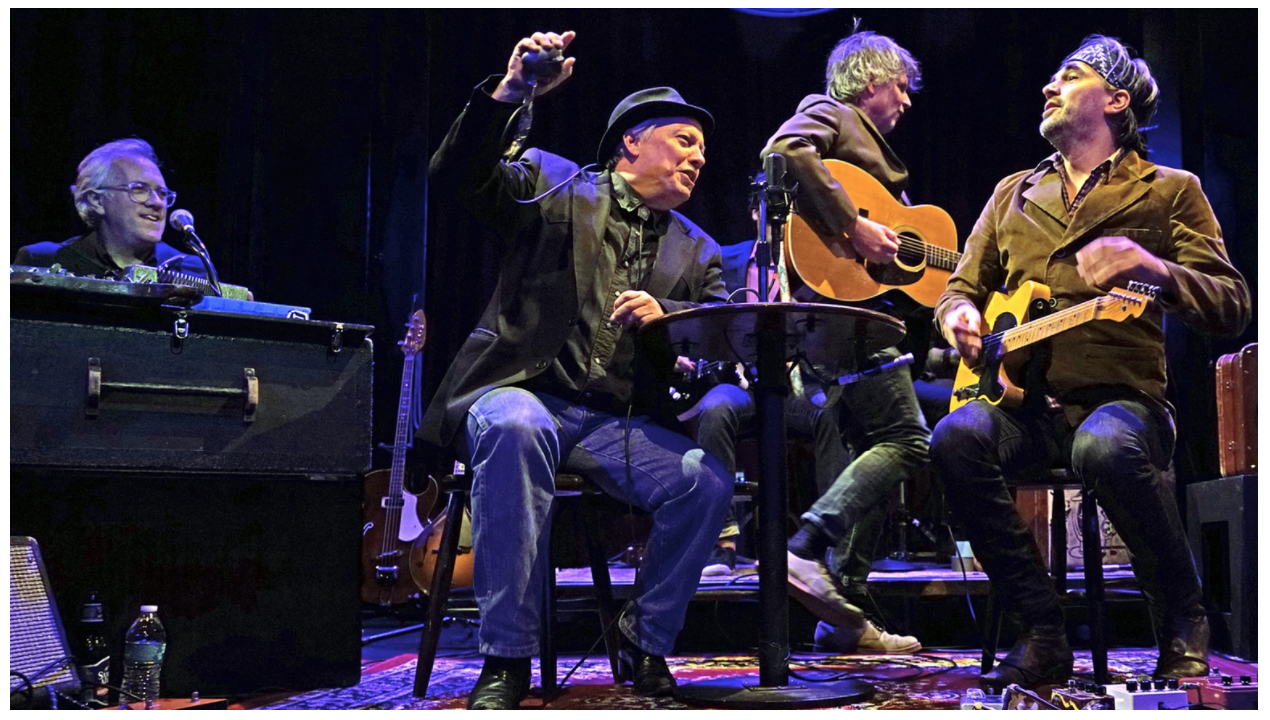An Interview with Ry Cavanaugh (Session Americana): The Proximity of Performance
Session Americana is releasing a new live album and they’re running a kickstarter campaign to get it going. The campaign has done well so far. The band has a really devoted fan base and they’ve peppered in some great rewards: this is your chance to get an “I’m With Dinty” shirt, something you probably need in your life. This is, as Mark Erelli said in a tweet supporting this kickstarter campaign, the best band in Boston (including Aerosmith). If you haven’t had the chance to attend one of their shows, you’re doing it wrong. We got to catch up with Ry Cavanaugh about the new record and the band’s work in the studio and on the stage. Check it out and get this album. It’ll be a good addition to your collection as springtime rolls in.

RLR: In the kickstarter campaign information, it says when you guys first heard this live recording, you didn’t think much of it, but that changed–what was it that shifted?
RC: I guess the feeling I had at the time was I just wasn’t thinking about a live recording, and I don’t tend to listen to those things. I saw the video they posted of the show and I just didn’t love the mix of the audio. It was a board mix, it was fine, but [my reaction] was just sort of, “Eh, that’s cool.” But it turns out they did a nice recording, they just didn’t do any post-production to speak of, so when we gave it to Paul Kolderie to mix a couple of the tunes, it was surprising to hear.
Sometimes if I hear music that I performed, I can’t see past my mistakes, so if they’re not in the right place in the mix, it’ll put me off. But I think Paul made some aesthetic decisions about what should be loud and what should be quiet and I think he emphasized stuff that sounded good. Most importantly, he made the electric guitar and electric harmonica really out front, which is where I like them to be. So I think we’re on track to have something cool.
RC: We’re well aware of that in the studio; we’ve all got enough experience in the studio to know that’s true. That said, if you’re an artist and you have regrets about a track or you know that’s not what you want, I don’t care if it’s David Rawlings or Quincy Jones, you have to say, “Look that’s not what I want.”
But I do think wise producers, and I’ve worked with a few of them, do know that. Because you can fix stuff, but you can’t fix feel, which is why when people argue about The Last Waltz or Waiting for Columbus, or some live albums that are hyper-polished, where you know they punched a bunch of stuff, and maybe overdubbed a guitar solo or fixed some vocals, I just don’t care about any of that, because you can’t make up that electricity of the performance and you can’t make up the feel of the song. All you can do is fix some problems. Frankly, it’s the drummer who’s screwed, because you can’t fix drums on live recordings. So if he’s good and everybody else is more or less in the right zone, you can usually punch something. We were lucky, with this record, we only changed one thing and the rest of it is just exactly as it was.
RLR: You’ve released a live record before, in 2011. Was that one also kind of an afterthought?
RC: It was, definitely. It’s nice to have versions of covers that we’ve done and have them out there, because it’s part of what we do, and it’s part of what people like about us. But we’re not going to make a studio record with, you know, a Rodney Crowell song on it; that just doesn’t seem likely. So it is nice to have that space; on this album, there will be 4-5 covers, and that’s interesting to hear. But, no, with the other one, we didn’t have that inclination either. This one is a lot more hi-fi than the other one but what I really loved about that other recording is that it had a lot of the energy of the Lounge, I thought, and I actually regret a little bit that we didn’t leave it a little more raw.
RLR: How does the nature of your live performance approach, with the session table, impact the way you all tend to write songs?
RC: I don’t think it influences the writing at all. In Session Americana, everybody writes and everybody sings, so what becomes an issue for us is what works live. Even if something ends up on a studio record, there’s no guarantee we’ll be able to make it work at the table. It’s just a different set of rules, and there’s plenty of songs, I’d say half of our songs, that are on our records that we just don’t do live and have never figured out how to do live.
I’ve actually been inspired by comedians and it’s sort of underrated how difficult it is developing material that works in front of people. We are often playing in front of people who have never heard us before. So you’re kind of in this place where you want to reach down into the bag and pull out something that is going to be functional, that the band is going to be confident in playing, and that on first listen is going to connect with people. There could be an instrumental passage that consistently brings people in, or there could be a harmony part that we notice is particularly effective. I do think the table has a certain threshold for which things work and don’t work.
On the other hand, the table is so forgiving for shit you don’t know is coming, or for somebody to sit in, because there’s literally nothing to do or change. You can just sit down and start playing. And our stage volume is such that you can more or less hear everything, so it allows for spontaneity. I’ve sort of found that what works really well with our group is the stuff we know well and that we perform well and all buy into, and then the stuff that just surprises the shit out of us. When we have a guest come and just start a song we don’t know, everybody’s going to light up and get with the program and the table really works for that stuff.
RLR: Just because there’s that energy about it?
RC: Well, there’s proximity, is really what it is. You’re not alone. You’re not standing there, away from everybody else, with your monitor mix of God knows what you just walked up to. It’s more like playing in a living room or in a college dorm than other ways of setting up.
RC: When it works, that’s exactly what it does. It doesn’t always work. Where we’re at now, we’re playing festival stages, we’re playing concert halls, we’re playing big nightclubs and tiny nightclubs, we’re playing house concerts. This month, Thursday night, we’re at Barbes, which is 50 people standing in a tiny room, and Friday night we’re playing in function room of a country club in Scituate, with a nice PA but with a seated audience. Saturday night, we’re playing in a 200-seat Town Hall, and then Sunday, we’re playing a house concert. So we’re playing these shows where everything is happening all the time, and you’re constantly adjusting, but the truth is the little ones are the easiest ones to make great. It’s not that bigger ones can’t be great, but I would say any acts, unless you’ve got a big flag to wave and you march around the stage, or you’re U2 or something, you’re always going to be a little better in those smaller rooms.
RLR: You guys have a residency at Barbes this month in Brooklyn. Can you talk about how having a residency at a venue impacts the way you and the band think about a string of residency shows?
RC: I’ve done a lot of residencies. And what you want to have happen, and it’s difficult, is to create a new culture. So you put yourself in a situation where you’re kind of the host of an event that happens every week, and every week, something else happens. You try to interest people in the event as something in and of itself, and I think people that catch on to that do come back week after week, because you’re not seeing a lot of repeat. There’s always going to be new people coming through. With a residency, we like to invite guests, so we think of it as a “Session Americana and friends,” rather than just a straight up concert. Jefferson’s in NY, and we’ve got a lot of Session diaspora there and we’ve been reaching out to people who will hopefully come out and sit in.
RLR: As part of Boston Stands, you have raised over $50,000 for the ACLU. Can you talk about that experience and how you think about music sustaining a sense of focus on what matters right now, politically?
RC: We’ve been running these nanofests. They’re high ticket price events and what’s been nice about nano is that normally when you do benefits, you ask a lot of people to do a lot of work, and you end up with a very high production costs, and I’ve done so many benefits that didn’t make very much at all. The people running Boston Stands, they are legit, and it’s a serious thing. We came in and tucked into one of their events and said, “We’re going to raise you another five grand.”
Activism is difficult in art for a variety of reasons and I think about it a lot, because I am most effective as a communicator when I’m doing music. I don’t have a twitter account where I can say shit people are going to listen to; I just don’t have that voice. I actually heard Jerry Seinfeld say this the other day–as artists, there is something charitable about doing what we do already. We serve this role in society that is not easy to fill and it’s not particularly well rewarded. It is a struggle, and most of us suffer with varying forms of insecurity and depression, things that everyone struggles with, but in the context of society sort of saying, “So what’s your day job?” all the time. But there’s something about what we do that also has to also be a break for everybody that is sort of pummeled by this stuff. I really believe that organizations like the ACLU and Planned Parenthood, they’re on our team. We have to stand up, we have to say something and participate.
Stand up! Say something! Participate! As noted in the interview, Session Americana has a string of shows around New England before they head to Europe on tour. Let’s get them funded for kickstarter and go out and see them before they set sail.

